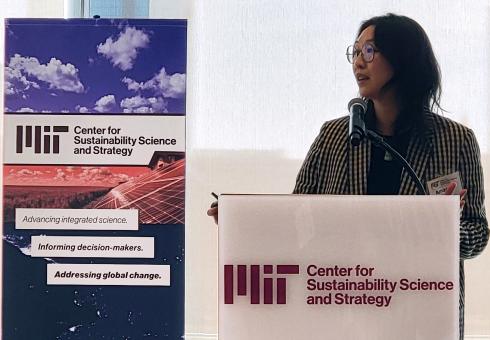Integrated Global System Modeling (IGSM) Framework
At the heart of CS3's work lies the MIT Integrated Global System Modeling (IGSM) framework.
Designed to analyze interactions between humans and the Earth system, this comprehensive set of models is used to study the causes, consequences and solutions to problems that arise from global change. We define global change broadly and consider the unintended impacts of global economic and population growth on natural resource availability, the climate, and air and water quality.
Modeling the Interaction of Human and Earth Systems
The IGSM framework consists primarily of two interacting components—the Economic Projection and Policy Analysis (EPPA) model and the MIT Earth System model (MESM). The EPPA model simulates the evolution of economic, demographic, trade and technological processes involved in activities that affect the environment at multiple scales, from regional to global. The result of these anthropogenic activities in terms of greenhouse gas emissions, conventional air and water pollutants, and land-use/land-cover change are input into the MESM, which comprises coupled sub-models of physical, dynamical and chemical processes in the atmosphere, land and freshwater systems, ocean and cryosphere.
To learn how your organization can benefit from funding our research, please visit the Sponsorship page.
Key Papers on the IGSM
- Development and application of earth system models
Prinn, R.G., PNAS, 110(Suppl. 1): 3673-3680 (2012). - The MIT Integrated Global System Model (IGSM) Version 2: Model Description and Baseline Evaluation
Sokolov et al., Joint Program Report 124, 40 pages (2005). - Description and Evaluation of the MIT Earth System Model (MESM) Sokolov et al., AGU Journal of Advances in Modeling Earth Systems , 10(8), 1759-1789 (2018)
Publications
Morris, J. and J.M. Reilly (2025)
Uncertainty in Climate Change Research: An Integrated Approach, Springer Cham, ISBN: 978-3-031-85541-2, Chapter 16, pp. 163-176 (doi: 10.1007/978-3-031-85542-9)
Salunke, P., A. Sokolov, C. A. Schlosser and J. Scott (2025)
CESM Workshop 2025, Poster
Morris, J., A. Sokolov, J. Reilly, A. Libardoni, C.S. Forest, S. Paltsev, C. A. Schlosser, R. Prinn and H. Jacoby (2025)
Nature Communications, 16(2703) (doi: 10.1038/s41467-025-57897-1)
News + Media
How climate modeling works, what the challenges are, what climate models can help us understand about our future, and how to best communicate this information to a world that needs to know what's coming next in order to adapt and prepare. Featuring Yi Ming, Professor of Earth & Environmental Sciences at Boston College, and Jennifer Morris, Principal Research Scientist at MIT CS3. Each episode of Climate Reveal takes a deep dive into a specific aspect of the climate crisis and ongoing work toward solutions. (Boston College Creative Communication Lab)
MIT CS3 researchers co-author chapter on emissions and concentration scenarios (Springer Cham, Chapter 16, pp. 163-176)
Key points from the 47th MIT Global Change Forum
Research Projects
People








